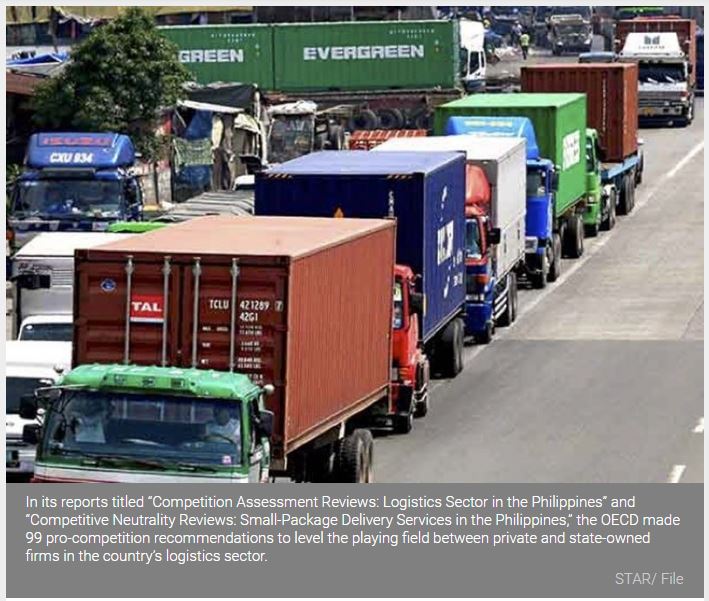OECD urges Philippines to improve logistics sector
MANILA, Philippines — The Organization for Economic Cooperation and Development (OECD) is recommending reforms, which include the delineation of regulatory and operational functions of the Philippine Ports Authority (PPA), amendment of the Public Service Act, and ensuring adequate compensation to the Philippine Postal Corp. (PHLPost) to improve the competitiveness of the logistics sector.
In its reports titled “Competition Assessment Reviews: Logistics Sector in the Philippines” and “Competitive Neutrality Reviews: Small-Package Delivery Services in the Philippines,” the OECD made 99 pro-competition recommendations to level the playing field between private and state-owned firms in the country’s logistics sector.
The reports are part of a broad project on fostering competition under the Association of Southeast Asian Nations Competition Action Plan 2016 to 2025.
Assessments on the Philippines were conducted by the OECD in partnership with the Philippine Competition Commission (PCC) and the UK government.
As part of the recommendations, Antonio Gomes, OECD deputy director for Financial and Enterprise Affairs at the OECD, said there should be a clear separation between the regulatory and operational and commercial functions of the PPA and regional port authorities.
“This will avoid conflicts of interest that can potentially discourage investments or uneven the playing field in the public and private entities,” he said.
Also being recommended by the OECD is to concentrate in a single entity the responsibility for regulating freight forwarders, regardless of the mode of transport to lower business costs.
Another recommendation made by the OECD is to amend the Public Service Act to clarify that freight transportation and logistics are not and should not be considered public utility.
“This will remove a number of barriers to entry, encouraging more firms to enter the market and compete,” Gomes said.
He said there is likewise a need to ensure PHLPost is compensated for the execution of its public service obligations including the delivery of letters and small packages to all parts of the country to maintain a level playing field with private competitors.
Gomes said the recommendations were made as OECD found competition issues in the logistics sector such as rules that are limiting market entry, exemptions from competition law, and rules that give preferential treatment to certain companies.
With a market size of $11 billion and a four percent share of the country’s gross domestic product, the OECD recognizes the role the logistics sector plays in economic development.
The Philippines’ cost of logistics to sales, however, remains high at 27 percent, compared to its neighbors in Southeast Asia.
“Ultimately, the policy recommendations in the reviews are about investment, jobs and growth. There is a need to reduce unnecessary legal and regulatory restrictions to competition, thus bringing prices down, and improving the quality of goods and services and increasing innovation,” Gomes said.
PCC chairperson Arsenio Balisacan said the antitrust body supports the pro-competition initiatives of the government to simplify processes and eliminate red tape.
“A competitive logistics industry is vital to recovery and key to increasing consumer welfare in the new normal, especially with the rise of digital commerce in bridging supply and demand in our markets,” he said.
For his part, UK Ambassador to the Philippines Daniel Pruce said “the UK government fully supports the goals and initiatives under the ASEAN Competition Action Plan 2016 to 2025 to help member countries build a fair and competitive environment where innovation, entrepreneurship, investments, and trade and industry could thrive.”
Source: https://www.philstar.com/business/2021/02/01/2074375/oecd-urges-philippines-improve-logistics-sector


 Thailand
Thailand




